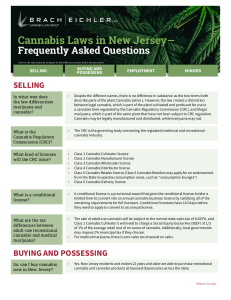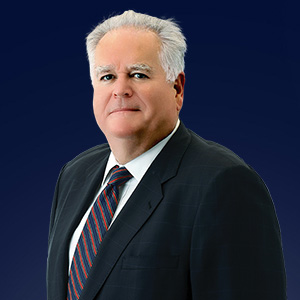Cannabis Laws in New Jersey – Frequently Asked Questions

11/4/2025
The rapidly developing Cannabis industry arising from laws permitting the use of medicinal cannabis, and, adult recreational use, brings with it a plethora of precedents yet to be set in the Garden State. This past April, the Cannabis Regulatory Commission met, kicking off the next steps in the long process of making legal cannabis sales a reality. Until the Commission adopts its rule and regulations, legal sales are on hold.
Brach Eichler receives numerous questions and inquiries regarding the current status of New Jersey cannabis sales, purchasing, consumption, and workplace regulations. To address your concerns, we have created Cannabis Laws in New Jersey – Frequently Asked Questions, a list of questions to keep you informed on the current state of affairs and policy developments in the cannabis industry.
Subscribe to our Cannabis Insights to receive the latest news and developments on the evolving New Jersey cannabis marketplace.
SELLING
In what way does the law differentiate marijuana and cannabis?
- Despite the different names, there is no difference in substance as the two terms both describe parts of the plant Cannabis sativa L. However, the law creates a distinction between legal cannabis, which is part of the plant cultivated and produced for use in a cannabis item regulated by the Cannabis Regulatory Commission (CRC), and illegal marijuana, which is part of the same plant that have not been subject to CRC regulation. Cannabis may be legally manufactured and distributed, while marijuana may not.
What is the Cannabis Regulatory Commission (CRC)?
- The CRC is the governing body overseeing the regulated medicinal and recreational cannabis industry.
What kind of licenses will CRC issue?
- Class 1 Cannabis Cultivator license
- Class 2 Cannabis Manufacturer license
- Class 3 Cannabis Wholesaler license
- Class 4 Cannabis Distributor license
- Class 5 Cannabis Retailer license (Class 5 Cannabis Retailers may apply for an endorsement from the State to operate consumption areas, such as “consumption lounges”)
- Class 6 Cannabis Delivery license
What is a conditional license?
- A conditional license is a provisional award that gives the conditional license-holder a limited time to convert into an annual cannabis business license by satisfying all of the remaining requirements for full licensure. Conditional licensees have 120 days before they need to apply to convert to an annual license.
What are the tax differences between adult-use recreational cannabis and medical marijuana?
- The sale of adult-use cannabis will be subject to the normal state sales tax of 6.625%, and Class 1 Cannabis Cultivator’s will need to charge a Social Equity Excise Fee (SEEF) of 1/3 of 1% of the average retail cost of an ounce of cannabis. Additionally, local governments may impose 2% municipal tax if they choose.
- For medical marijuana, there is zero sales tax imposed on sales.
BUYING AND POSSESSING
So, can I buy cannabis in New Jersey?
- New Jersey residents and visitors 21 years and older are able to purchase recreational cannabis and cannabis products at licensed dispensaries across the state.
Where can I legally purchase cannabis?
- Cannabis products can be purchased at New Jersey’s licensed medical marijuana dispensaries and licensed cannabis retailers.
How much can I legally buy?
- Registered Patients: Registered patients may purchase up to 3.0 oz of medical cannabis or cannabis product from medical marijuana dispensary every 30 days, though the dosage is directed by the authorizing health care provider. Terminally ill patients are exempted from the maximum limits.
- Recreational Users: Recreational cannabis consumers (without a medical card) will be able to buy up to 1 oz of dried flower or up to 4 grams of concentrates, resins, or oils or 10 100mg packages of ingestible items in a single transaction.
Are edibles available to buy?
- Cannabis products are currently available as dried flower, concentrated oils, lozenges, and other chewable forms, pills, tablets, capsules. Drops and syrups, tinctures, and topical, transdermal, and sublingual forms are available.
- Food-based edibles must be “non-TCS food” or “shelf stable food,” meaning food that is able to be safely stored at room temperature in a sealed container without the need for time or temperature control methods in order to limit pathogenic microorganism growth or toxin formation.
Is it legal to possess cannabis in New Jersey?
- In November of 2020, the state constitution was amended to legalize the recreational use of marijuana for adults aged 21 and older. The law removed criminal and civil penalties for possession of up to 6 oz for adults 21 and over. The constitutional amendment took effect on January 1, 2021.
How much cannabis can I legally possess?
- Individual adults may legally possess up to 6 oz of marijuana, including any adulterants or dilutants, or up to 17 grams of hashish.
What is Hashish?
- Hashish means the resin extracted from any part of the plant Cannabis sativa L. Under the new laws, marijuana and hashish are still defined as “controlled dangerous substance” but are largely decriminalized for non-distribution offenses. Individual adults may legally possess up to 17 grams of hashish.
Can I give cannabis as a gift?
- You can gift another adult 21 year of age or older up to 1 oz.
Can I get cannabis delivered to me?
- Yes, delivery drivers that are certified by the CRC working for a licensed facility can deliver marijuana directly to customers.
Can a municipality restrict cannabis delivery services in their jurisdiction?
- A municipality can restrict cannabis delivery service businesses, but in no case may a municipality restrict the transportation or delivery of cannabis items within the municipality. Any such restriction shall be deemed void and unenforceable.
Can I buy cannabis out-of-state where it is legally sold and bring it back to New Jersey?
- Legally produced marijuana must stay within the state where it was grown. Marijuana remains illegal at the federal level, and so does bringing it over state lines. Furthermore, it would be illegal to get cannabis shipped from out of state.
Can out-of-state residents buy cannabis in New Jersey and take it back with them?
- Out-of-state residents who buy in New Jersey cannot legally take it back home, due to federal prohibition that blocks interstate travel with marijuana. Legal cannabis purchased in New Jersey should also be consumed in New Jersey.
Can you drive with marijuana?
- Driving under the influence of marijuana is illegal. However, possessing up to 6 oz of marijuana or up to 17 grams of hashish in a car will fall under the same rules as a possession as long as the driver is not consuming it.
Can police officers search my car based on the smell of cannabis?
- The odor of cannabis, either burnt or raw, by itself no longer constitutes “reasonable suspicion” to justify a continued stop of an individual under the age of 21, nor does it provide “probable cause” to search the person’s personal property or vehicle.
Where can you smoke cannabis?
- Smoking or using cannabis in public places is prohibited. Recreational cannabis can only be consumed in a private residency or in specific designated areas, such as consumption areas.
- Consumption areas mean a designated location operated by a licensed cannabis retailer or permit holder for dispensing medical cannabis, for which both a State and local endorsement has been obtained, that is either:
- an indoor structurally enclosed area of the cannabis retailer or permit holder that is separate from the area in which retail sales of cannabis items or the dispensing of medical cannabis occurs; or
- an exterior structure on the same premises as the cannabis retailer or permit holder, either separate from or connected to the cannabis retailer or permit holder, at which cannabis items or medical cannabis either obtained from the retailer or permit holder, or brought by a person to the consumption area, may be consumed.
- 20% of the guest rooms of a hotel, motel, or other lodging establishment would be permitted by the person or entity that owns or controls that establishment.
Where is cannabis prohibited?
- For consumption, the smoking, vaping, or aerosolizing of a cannabis item would be prohibited in any place pursuant to law that prohibits the smoking of tobacco, as well as any “indoor public place” as defined in the New Jersey Smoke-Free Air Act.
- Indoor public places include:
- Workplace;
- Public parks or beaches;
- Outdoor passenger pick-up and drop off area;
- Airport; and
- Any area of any building of, or on the grounds of, any public or nonpublic elementary or secondary school.
- Smoking, vaping, or aerosolizing cannabis could also be prohibited in:
- Private multifamily housing, as decided by the person or entity that owns or controls the housing;
- The structure or specific units within the structure of a cooperative by the corporation of other legal entity that owns the structure; and
- The units of a condominium, if approved by its association and a majority of all of the unit owners.
Can I grow cannabis plants at home in New Jersey?
- Personal cultivation of both medical marijuana and recreational cannabis is illegal in New Jersey. Cultivation or manufacturing requires a license and is for commercial uses only.
What are the major differences between adult-use recreational cannabis and medical marijuana?
- Consumer Considerations & Patient Registration
- Adult-use recreational: 21 years of age
- Medical marijuana: Medical conditions; Required physician registration
- Prescription Quantities & Patient Possession
- Adult-use recreational: 1 oz
- Medical marijuana: up to 3 oz per month
EMPLOYMENT
Can an employer fire an employee for cannabis consumption?
- An employer is not be permitted to refuse to hire or employ a person, or discharge or take any adverse action against an employee because that person or employee does or does not use cannabis items.
- Under the law, the presence of the cannabinoid metabolites in the body of a person engaged in permitted conduct outside of work, could not form the basis for refusal to employ or otherwise penalize that person.
- However, an employer may terminate or refuse to hire an employee who uses cannabis if it would violate the terms of a federal contract or cause the employer to lose federal funding.
Can an employer require an employee to undergo a drug test?
- An employer may require the employee to undergo a drug test:
- Upon reasonable suspicion of an employee’s usage of a cannabis item while engaged in the performance of the employee’s work responsibilities;
- Upon finding any observable signs of intoxication related to usage of a cannabis item;
- Following a work-related accident subject to investigation by the employer;
- Random drug testing;
- Testing as part of a pre-employment screening; or
- Regular screening of current employees to determine use during an employee’s prescribed work hours.
- Questions about your employer’s policies on drug testing and how they apply to you should be directed to your human resources department and/or a lawyer specializing in employment law.
MINORS
What happens when a child under 21 gets caught for either possessing or consuming marijuana?
- First Offense: Anyone younger than 21 caught possessing or consuming marijuana will no longer be arrested or fined. Instead, young people will receive warnings that escalate. Upon a first offense, they will get a written warning for a first offense. The cleanup bill (S3565) that was signed into law on March 26, 2021 requires law enforcement to provide written notification to parent or guardian of person under age 18 who commits first offense of unlawfully possessing or consuming cannabis, marijuana, or hashish.
- Second Offense: Those younger than 21 caught a second time smoking marijuana or possessing marijuana will receive another written warning, along with materials on community drug treatment services. For individuals under the age of 18, the officer is required to provide the individual’s parent or guardian with copies of the warning’s issues for both the first and second offenses.
- Third or Subsequent Offense: Getting caught with such items for a third time or more means another written warning and more information on community drug treatment services. The written warning also will get sent to a community drug treatment program, for people between 18 and 21; while parents or guardians get copies of the following warning for those younger than 18.
- For those younger than 21, possession of more than 6 oz of marijuana or 17 grams of hashish still is a fourth-degree crime and may be issued a complaint summons and fingerprinted at their first court appearance.
Can a child under 21 get arrested for refusing to provide identifying information for the written warning or putting the marijuana in their pocket or concealing it in some way?
- Initially, the officer should take reasonable efforts to explain the situation to the underage individual if the underage individual refused to give their identifying information.
- If the underage individual continues to refuse, the law does not allow for the underage individual to be placed under arrest or taken into custody, unless the individual has engaged in some affirmative act of interference with the officer; simply refusing to turn over the marijuana does not constitute affirmative act.
New Jersey cannabis law will continue to evolve and Brach Eichler will make sure to continue to provide our clients with the most up-to-date information.
This document is intended for informational and discussion purposes only. The information contained in this document is not intended to provide, and does not constitute legal advice or establish the attorney/client relationship by way of any information contained herein. Brach Eichler LLC does not guarantee the accuracy, completeness, usefulness or adequacy of any information contained herein. Readers are advised to consult with a qualified attorney concerning the specifics of a particular situation.
Related Practices: Cannabis Industry
Related Attorney: John D. Fanburg, Charles X. Gormally, Andrew M. Kuder, Matthew M. Collins, Riza I. Dagli, Carol Grelecki, Allen J. Popowitz, Susan R. Rubright, Jay Sabin, Frances B. Stella, John R. Zepka
Related Industry: Cannabis














